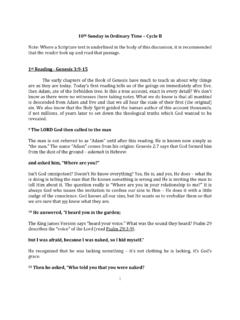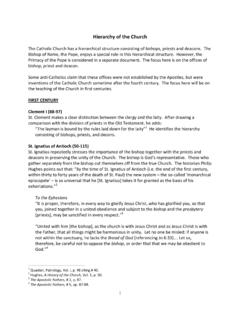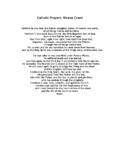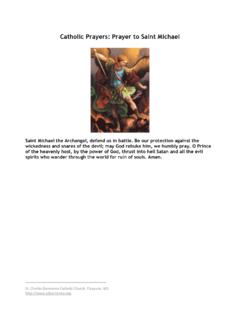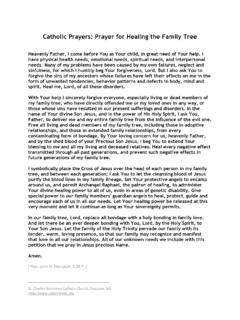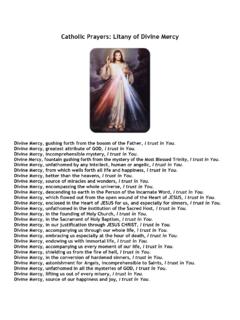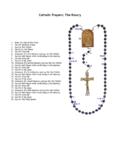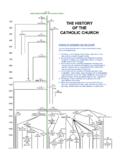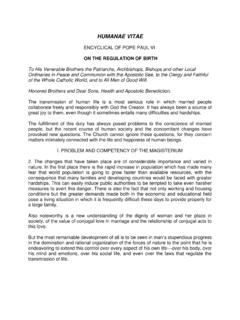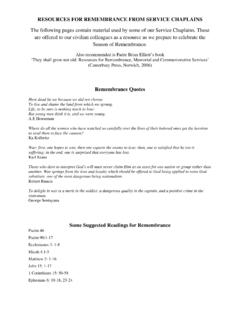Transcription of 33rd Sunday in Ordinary Time - Cycle B - Charles Borromeo
1 1 33rd Sunday in Ordinary time Cycle B Note: Where a Scripture text is underlined in the body of this discussion, it is recommended that the reader look up and read that passage. 1st Reading - Daniel 12:1-3 Although this book tells us virtually all that we know about the Prophet Daniel (whose name means God is my judge ), the author of this book is unknown. The book is arranged in no historical order and has come down to us with different parts written in different languages some in Hebrew, some in Aramaic, and some in Greek. The portion in Greek [chapter 13 (Susanna), chapter 14 (Bel and the Dragon), and chapter 3:24-90 (The Prayer of Azariah)] are not contained in the Hebrew or, consequently, Protestant canon of scripture.
2 There are unusual changes in construction throughout, the first person frequently alternating with the third. This leads scholars to suspect that multiple authors (and/or editors) may be involved. The Hebrew Bible locates Daniel in the historical section between Ezra and Esther. The Septuagint (the Greek translation used by the apostles) locates it in the section of prophetic writings as the fourth of the major prophets, after Ezekiel; which is where it is located in Catholic (and strangely, since they follow the Hebrew canon, Protestant) Bibles. The book was written around 300 or later, while Daniel himself lived some 225 to 300 years earlier.
3 Daniel had 4 apocalyptic visions which are described in chapters 7 through 12. Today s reading comes from the ending of the 4th of these visions. [In those days, I, Daniel, heard this word of the Lord:] 12:1 AAt that time there shall arise Michael, the great prince, guardian of your people; Michael is Israel s prince (Daniel 10:21). The idea was common in Judaism that every nation had its guardian angel (see Deuteronomy 32:8 where sons of God refers to angels). Inasmuch as Michael is Israel s guardian angel, he is one of the chief princes, or archangels. It shall be a time unsurpassed in distress since nations began until that time .
4 At that time your people shall escape, everyone who is found written in the book. The book of life (see Exodus 32:32-33; Psalm 69:28). These will be saved. 2 Many of those who sleep in the dust of the earth A euphemism for are dead. 2 shall awake; Shall come back to life. This is the earliest enunciation of the belief in the resurrection of the dead. some shall live forever, Literally, some unto life everlasting the first occurrence of this term in the Bible. others shall be an everlasting horror and disgrace. 3 But the wise shall shine brightly like the splendor of the firmament, The stars, heavenly bodies And those who lead the many to justice shall be like the stars forever.
5 2nd Reading - Hebrews 10:11-14, 18 This is our last week in the Book of Hebrews. Rather than just study the verses leading up to and through the reading this week, let s study all of Chapter 10 which will take over where we left off last week: 10:1 Since the law has only a shadow of the good things to come, and not the very image of them, The Old Covenant foreshadows that which is to come through Christ and New Covenant. it can never make perfect those who come to worship by the same sacrifices that they offer continually each year. The annual Day of Atonement (Yom Kippur) sacrifices were not able to remove sin, they simply foreshadowed the sacrifice of Jesus.
6 2 Otherwise, would not the sacrifices have ceased to be offered, since the worshipers, once cleansed, would no longer have had any consciousness of sins? The very repetition of the sacrifices proves their impotence. If they had taken away the barriers to approaching God directly, they would not have needed to be repeated. 3 But in those sacrifices there is only a yearly remembrance of sins, The Greek word for remembrance is anamnesis. The only other New Testament usage of 3 this word is Do this in remembrance of me (Luke 22:19; 1 Corinthians 11:24-25). This remembrance was not mere reminiscence, but an annual rejection of the golden calf sins; just as the Passover meal was an annual renewal of their covenant with God 4 for it is impossible that the blood of bulls and goats take away sins.
7 5 For this reason, when he came into the world, he said: Sacrifice and offering you did not desire, but a body you prepared for me; 6 holocausts and sin offerings you took no delight in. 7 Then I said, As is written of me in the scroll, Behold, I come to do your will, O God. Here the sacred author has quoted Psalm 40:6-7 in the Greek Septuagint form; which is how we know that the apostles used the Greek translation. The Hebrew form says my ears you have pierced (or opened) while the Greek says a body you have prepared for me . The meaning of the Psalm is that God prefers obedience to sacrifice. This is not a repudiation of ritual, but a statement of its inferiority relative to obedience.
8 Jesus obedience was expressed by His willing offering of His Body in death. 8 First he says, Sacrifices and offerings, holocausts and sin offerings, you neither desired nor delighted in. These may be meant to cover the four main types of offerings: sacrifices (peace offerings), offerings (cereal offerings), burnt offerings (holocausts), and sin offerings (includes guilt offerings). These are offered according to the law. According to the covenant with Moses. This statement prepares the hearer for the verse which follows. 9 Then he says, Behold, I come to do your will. He takes away the first to establish the second. The first and second are references to covenants.
9 10 By this will, Recall from our discussion last week that the Greek word for will is the same as that for covenant which is a better translation. we have been consecrated through the offering of the body of Jesus Christ once for all. 11 Every priest stands daily at his ministry, offering frequently those same sacrifices that can never take away sins. A reference to the Levitical priesthood rather than the high priest. The emphasis here is not 4 on the Day of Atonement ritual, but the daily ritual. 12 But this one offered one sacrifice for sins, and took his seat forever at the right hand of God; The contrast of the standing priest and the seated Christ has been used by some to argue that Jesus one sacrifice is offered once and is over, as opposed to the Catholic view of eternally being offered.
10 It does not mean that the sacrifice is over and done but instead uses the imagery of Psalm 110 and is addressing the dual role (royal and priestly) which Jesus exercises. His being seated applies to his kingly status which he exercises in addition to his status as ministering priest 13 now he waits until his enemies are made his footstool. See Psalm 110:1. The waiting is the time between Jesus enthronement and the parousia. 14 For by one offering he has made perfect forever those who are being consecrated. Jesus has given his followers access to His Father they share in His priestly consecration. Jesus priestly consecration of the Holy of Holies involved His obedience through suffering.
